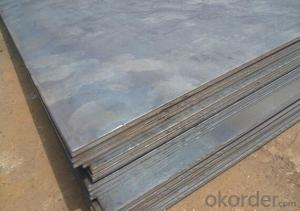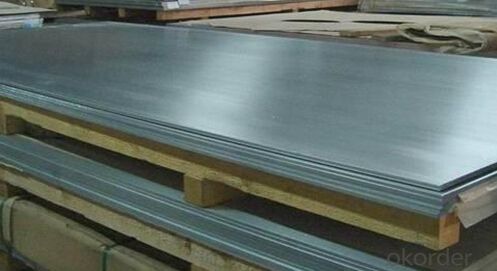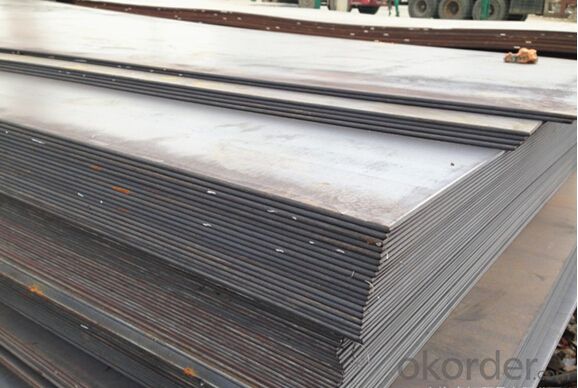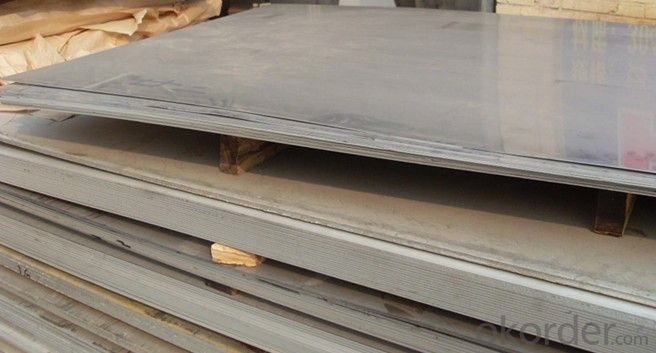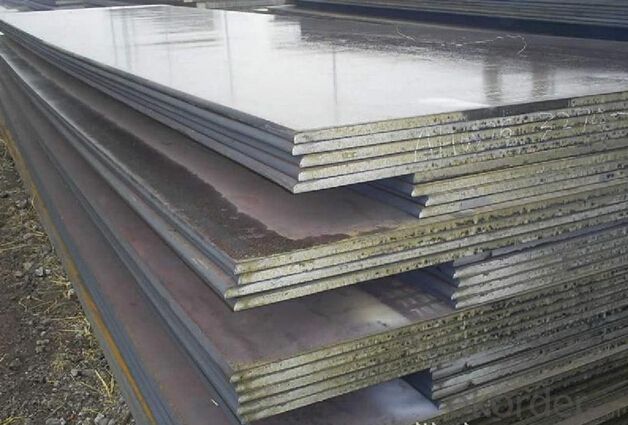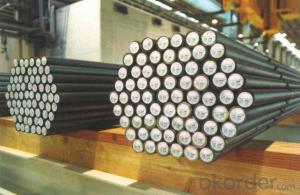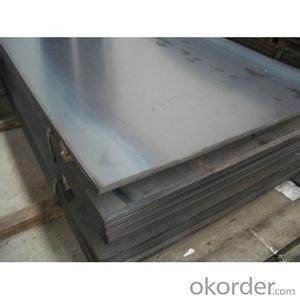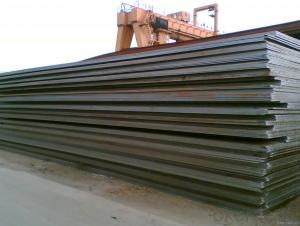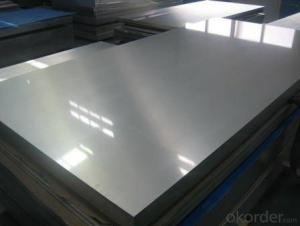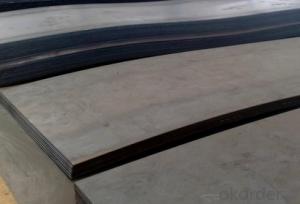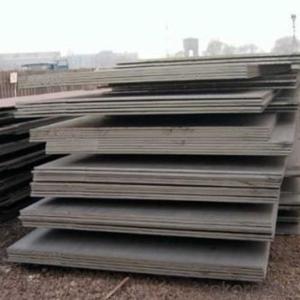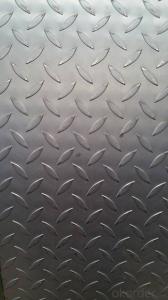Q235 Carbon Steel Sheet Prices Hot Rolled Mild Steel Plate Prices
- Loading Port:
- Tianjin
- Payment Terms:
- TT OR LC
- Min Order Qty:
- 3 m.t.
- Supply Capability:
- 100000 m.t./month
OKorder Service Pledge
OKorder Financial Service
You Might Also Like
Specification
Q235 Carbon Steel Sheet Prices Hot Rolled Mild Steel Plate Prices
Detailed Information of Q235 Carbon Steel Sheet Prices Hot Rolled Mild Steel Plate Prices
| C | Si | P | S | yield Strength MAp | Tensile strength MAp | Elongation % | ||
| A36 | 0.24 | 0.4 | 0.045 | 0.03 | 250 | 400-520 | 26 | |
| C | Si | Mn | P | S | Cu | |||
| A283 | ≤0.27 | 0.15-0.4 | ≤0.9 | ≤0.035 | ≤0.04 | ≥0.2 | ||
| Thickness: | 6mm, 8mm, 12mm, 16mm, 20mm, 25mm, 30mm, 50mm, 80mm, 100mm, 150mm, 200mm | |||||||
| Width: | 1500mm, 1800mm, 2000mm, 2200mm, 2500mm | |||||||
| Length: | 6000mm, 8000m, can cut to width and length | |||||||
| Packing Details; | according to customer‘s require or export’s standard | |||||||
| Delivery time; | 7 days for stock sizes, 20-25 days for new production sizes | |||||||
| Port: | Tianjin China | |||||||
Related Products Overviews of Q235 Carbon Steel Sheet Prices Hot Rolled Mild Steel Plate Prices
Product Name | Typical Grades | Diameter(mm) | Standard Adopted |
Carbon Steel | 20 (1020/S20C/C22) |
Ø16-Ø300 |
GB/SAE/ JIS/DIN |
40 (1040/S40C/C40) | |||
45 (1045/S45C/C45) | |||
Bearing Steel | GCr9 (51100/SUJ1) |
Ø12-Ø250 | |
GCr15 (52100/SUJ2/100Gr6) | |||
GCr9SiMn (A485-Gr.1/SUJ3) | |||
Cr-Mo Steel | 20Cr (5120/SCr420H/20Cr4) |
Ø12-Ø250 | |
40Cr (5140/SCr440/41Cr4) | |||
42CrMo(4140/SCM440/42CrMo4) | |||
Gear Steel | 20CrNiMo |
Ø16-Ø600 | |
20CrMn(5115/SMnC420/20MnCr5) | |||
20CrNiMo(8620/SNCM220/20CrMiMo2) |
Related Products Application of Q235 Carbon Steel Sheet Prices Hot Rolled Mild Steel Plate Prices
Carbon Steel | l Mold bottom l Plastic mold l Construction machinery parts l Automobile parts l Security grills l Screens l Construction |
Bearing Steel | l Aerospace l Navigation l Nuclear energy l Chemical industry l Electronic information l Petrochemical l Instrument and meter l Transportation |
Cr-Mo Steel | l Mechanism & Fasteners gear l Stressed components for vehicles l Engines and machines l Parts of larger cross-section |
Gear Steel | l All kinds of gears l Statically and dynamically stressed component for vehicles l Engines and machine l Larger cross-section parts l Crankshafts |
Company Introduction of Q235 Carbon Steel Sheet Prices Hot Rolled Mild Steel Plate Prices
CNBM International Corporation is the most import and export platform of CNBM group(China National Building Material Group Corporation) ,which is a state-owned enterprise, ranked in 270th of Fortune Global 500 in 2015.
With its advantages, CNBM International are mainly concentrate on Cement, Glass, Iron and Steel, Ceramics industries and devotes herself for supplying high quality series of refractories as well as technical consultancies and logistics solution.
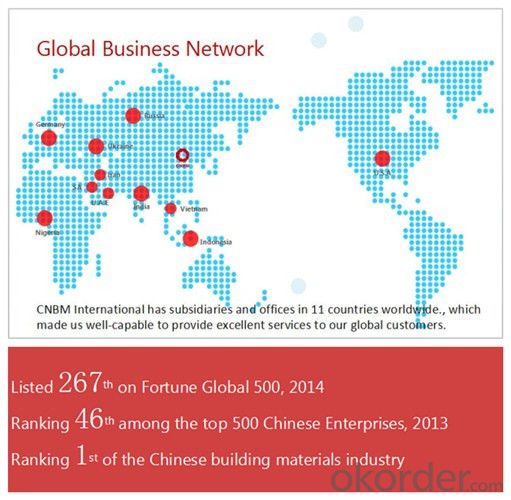
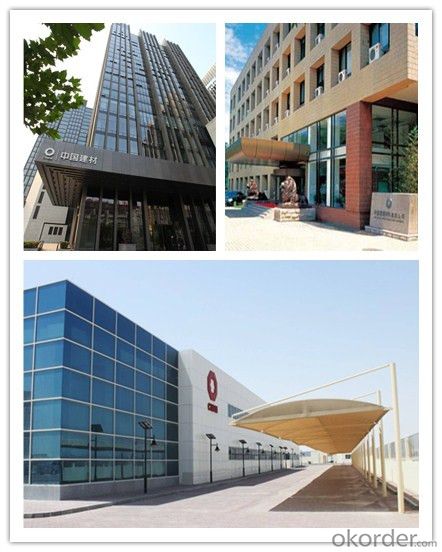
After-sale service | l CNBM provides the services and support you need for every step of our cooperation. We’re the business partners you can trust; you can relax and get on with doing business. l For any problem, please kindly contact us at any your convenient time, we’ll reply you in our first priority within 24 hours
|
Advantages
| l Industry experience over 20 years. l Shipment of goods -More than 70 countries worldwide. l The most convenient transport and prompt delivery. l Competitive price with best service. l High technical production line with top quality products. l High reputation based on best quality products.
|
Packaging & Delivery of Q235 Carbon Steel Sheet Prices Hot Rolled Mild Steel Plate Prices
Packaging Detail | Sea worthy packing /as per customer's packing instruction |
Delivery Detail | 15 ~ 40 days after receiving the deposit |
Products Show
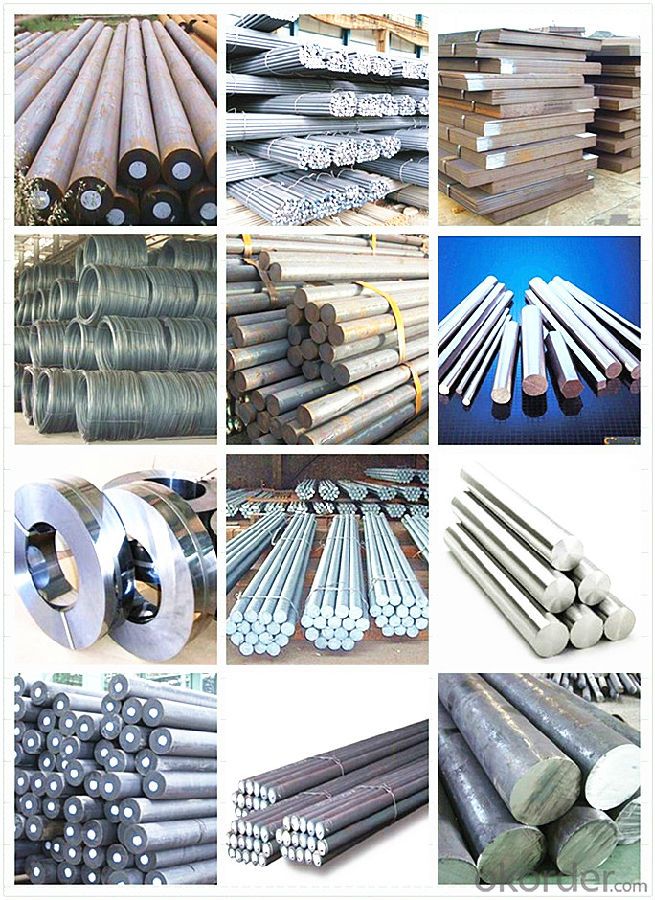
FAQ:
Are you a trading company or manufacturer? | Manufacturer |
What’s the MOQ? | 3 metric ton |
What’s your delivery time? | 15-35 days after downpayment received |
Do you Accept OEM service? | Yes |
what’s your delivery terms? | FOB/CFR/CIF |
What's the Payment Terms? | 30% as deposit,70% before shipment by T/T |
Western Union acceptable for small amount. | |
L/C acceptable for large amount. | |
Scrow ,Paybal,Alipay are also ok | |
Why choose us? | Chose happens because of quality, then price, We can give you both. Additionally, we can also offer professional products inquiry, products knowledge train (for agents), smooth goods delivery, excellent customer solution proposals. |
What's your available port of Shipment? | Main Port, China |
What’s your featured services? | Our service formula: good quality+ good price+ good service=customer's trust
|
Where are your Market? | Covering more than 160 countries in the world |
- Q: What are the main factors affecting the toughness of special steel?
- The main factors affecting the toughness of special steel are its composition, microstructure, and heat treatment. Composition plays a crucial role in determining the toughness of special steel. The presence of certain alloying elements such as chromium, molybdenum, nickel, and vanadium can enhance the toughness of steel. These elements form solid solutions or precipitates in the steel matrix, which impede the propagation of cracks and improve the material's resistance to fracture. Microstructure also plays a significant role in determining the toughness of special steel. The size, shape, and distribution of the various phases in the steel, such as ferrite, pearlite, bainite, and martensite, affect its toughness. Fine-grained microstructures typically exhibit higher toughness due to their increased resistance to crack propagation. Heat treatment is another essential factor in controlling the toughness of special steel. The process of heating and cooling the steel can modify its microstructure, altering its toughness. Quenching, tempering, and annealing are common heat treatments used to improve the toughness of steel. Quenching and tempering, for example, can produce a microstructure with a desirable balance of hardness and toughness. Other factors that can affect the toughness of special steel include the presence of impurities, non-metallic inclusions, and the presence of residual stresses. Impurities and inclusions can act as stress concentrators and reduce the toughness of the steel. Residual stresses, which can arise during manufacturing processes, can also impact the toughness of the material by creating regions of high stress that can initiate crack formation. In summary, the composition, microstructure, heat treatment, presence of impurities and inclusions, and residual stresses are the main factors affecting the toughness of special steel. Understanding and controlling these factors are crucial for optimizing the toughness and performance of special steels in various applications.
- Q: What are the different heat treatment furnaces used for special steel?
- Special steel is commonly subjected to various heat treatment processes using different types of furnaces. Each furnace serves a specific purpose and is engineered to create the ideal heating and cooling conditions necessary for the steel to attain its desired properties. One of the furnaces employed for special steel is the annealing furnace. This furnace utilizes a technique called annealing, which entails heating the steel to a specific temperature and then gradually cooling it to enhance its softness and ductility. To prevent oxidation during the process, annealing furnaces are often equipped with controlled atmospheres. Another type of furnace utilized for special steel is the quenching furnace. Quenching is a process that involves rapidly cooling the steel to increase its hardness. Quenching furnaces are designed to provide the required cooling rate and may utilize specialized cooling mediums like oil or water to achieve the desired outcome. Tempering furnaces are also commonly employed for special steel. Tempering involves heating the steel to a specific temperature and subsequently cooling it to enhance its toughness and reduce brittleness. These furnaces enable precise temperature control throughout the tempering process. Furthermore, carburizing furnaces are utilized for special steel. Carburizing is the process of introducing carbon into the surface of the steel to enhance its hardness. Carburizing furnaces are equipped with controlled atmospheres and designed to provide the necessary temperatures and carbon-rich environments for the carburizing process. In summary, the various heat treatment furnaces used for special steel serve distinct purposes such as annealing, quenching, tempering, or carburizing. These furnaces are meticulously engineered to provide the requisite heating and cooling conditions for the steel to achieve its desired properties.
- Q: What are the different methods for improving the electrical conductivity of special steel?
- There are several methods for improving the electrical conductivity of special steel, including alloying, heat treatment, and surface modifications. Alloying involves adding elements like copper, nickel, or silver to the steel to enhance its conductivity. Heat treatment processes such as annealing or quenching can also improve conductivity by altering the microstructure of the steel. Additionally, surface modifications like electroplating or coating can be employed to enhance electrical conductivity.
- Q: What is the significance of special steel in the medical field?
- Special steel, also known as medical grade steel, plays a crucial role in the medical field due to its unique properties and significance. It is specifically designed and manufactured to meet the stringent requirements of the healthcare industry. The significance of special steel in the medical field can be understood through the following points: 1. Biocompatibility: Special steel is biocompatible, meaning it is non-toxic and does not provoke an adverse reaction when in contact with the human body. This makes it an ideal material for medical devices such as surgical instruments, implants, and orthopedic tools. 2. Corrosion resistance: Special steel is highly resistant to corrosion and rust, ensuring the longevity and durability of medical instruments. Instruments used in surgical procedures need to be repeatedly sterilized, and the corrosive nature of sterilization agents can degrade ordinary steel. Special steel, with its superior corrosion resistance, can withstand these harsh conditions, reducing the risk of contamination and maintaining the integrity of medical equipment. 3. Mechanical properties: Special steel possesses excellent mechanical properties, such as high strength, toughness, and ductility. These characteristics are essential for medical devices, as they need to withstand the stresses and strains of surgical procedures, maintain their shape, and provide reliable performance. 4. Sterilization compatibility: Special steel can withstand various sterilization methods, including steam sterilization, ethylene oxide sterilization, and gamma radiation. This ensures that medical instruments made from special steel can be effectively sterilized, preventing the transmission of infections and reducing the risk of contamination during surgeries. 5. Precision manufacturing: Special steel can be fabricated into intricate shapes and sizes, allowing the production of precise medical instruments. Its superior machinability enables the creation of fine and sharp edges, crucial for surgical tools used in delicate procedures. 6. Antibacterial properties: Some special steels, such as stainless steel, possess inherent antibacterial properties. This characteristic is particularly important in the medical field, where the prevention of infections is paramount. Instruments made from antibacterial special steel can inhibit the growth of bacteria, minimizing the risk of post-operative complications. In summary, the significance of special steel in the medical field lies in its biocompatibility, corrosion resistance, mechanical properties, sterilization compatibility, precision manufacturing, and potential antibacterial properties. These qualities make special steel an indispensable material for manufacturing medical devices, ensuring their reliability, durability, and safety for both healthcare professionals and patients.
- Q: How does special steel contribute to the aerospace material cost reduction?
- Special steel contributes to the aerospace material cost reduction by offering enhanced properties such as high strength, lightweight, and corrosion resistance. These qualities allow for the use of thinner and lighter steel components, reducing the overall weight of the aircraft. This, in turn, leads to lower fuel consumption, maintenance costs, and increased payload capacity. Furthermore, the durability and long lifespan of special steel reduce the need for frequent replacements, resulting in cost savings for the aerospace industry.
- Q: How is special steel used in the food processing industry?
- Special steel is used in the food processing industry for various applications such as manufacturing equipment, machinery, and tools. It is particularly utilized in the production of cutting blades, mixers, grinders, and other components that require high strength, durability, and resistance to corrosion. This type of steel ensures the hygienic processing of food products, maintains product quality, and meets the stringent safety standards required in the industry.
- Q: How does special steel perform in terms of magnetic properties?
- Special steel can exhibit a wide range of magnetic properties depending on its composition and processing. Some special steels, such as stainless steel, are generally non-magnetic or have very low magnetic permeability. However, certain types of special steel, such as tool steel or high-speed steel, can be engineered to possess magnetic properties suitable for specific applications, such as magnetic tools or electrical transformers. Overall, the magnetic properties of special steel can be tailored to meet the desired requirements for different applications.
- Q: How is special steel used in the automotive industry?
- Special steel is used in the automotive industry for various applications such as engine components, suspension systems, and safety features. Its unique properties, including high strength, durability, and heat resistance, make it ideal for manufacturing critical parts that require exceptional performance and reliability.
- Q: How does special steel contribute to the power generation sector?
- Special steel contributes to the power generation sector by offering enhanced strength, durability, and corrosion resistance properties required for critical components such as turbine blades, shafts, and boiler tubes. This high-performance steel ensures efficient power generation by withstanding extreme temperatures and pressures, thereby increasing the overall efficiency and reliability of power plant operations.
- Q: What are the requirements for special steel used in defense equipment manufacturing?
- The requirements for special steel used in defense equipment manufacturing typically include high strength and durability, resistance to corrosion and wear, good toughness and impact resistance, as well as the ability to withstand extreme temperatures and harsh environments. Additionally, the steel must meet stringent quality control standards and industry specifications to ensure its reliability and performance in critical defense applications.
Send your message to us
Q235 Carbon Steel Sheet Prices Hot Rolled Mild Steel Plate Prices
- Loading Port:
- Tianjin
- Payment Terms:
- TT OR LC
- Min Order Qty:
- 3 m.t.
- Supply Capability:
- 100000 m.t./month
OKorder Service Pledge
OKorder Financial Service
Similar products
Hot products
Hot Searches
Related keywords
